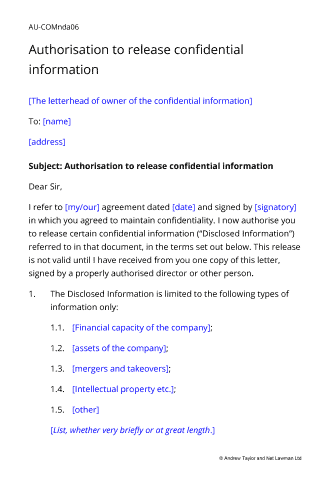Authorisation to release confidential information

Document overview

 ACT
ACT NSW
NSW NT
NT QLD
QLD SA
SA TAS
TAS VIC
VIC WA
WA

- Length:2 pages (290 words)
- Available in:
 Microsoft Word DOCX
Microsoft Word DOCX Apple Pages
Apple Pages RTF
RTF

If the document isn’t right for your circumstances for any reason, just tell us and we’ll refund you in full immediately.

We avoid legal terminology unless necessary. Plain English makes our documents easy to understand, easy to edit and more likely to be accepted.

You don’t need legal knowledge to use our documents. We explain what to edit and how in the guidance notes included at the end of the document.

Email us with questions about editing your document. Use our Lawyer Assist service if you’d like our legal team to check your document will do as you intend.

Our documents comply with the latest relevant law. Our lawyers regularly review how new law affects each document in our library.
About this document
Signing a confidentiality agreement is only the first step towards protecting your confidential information. Simply put, a confidentiality agreement restricts the other party from disclosing or revealing your confidential information to any third party. An authorisation letter on the other hand lets you specify exactly who is entitled to receive the confidential information other than the person with whom you have made signed a confidentiality agreement.
This authorisation to release confidential information to third parties (employees, agents, advisors or any other party you choose) ensures your confidential information is not passed into the wrong hands. Use it to protect your interests.
Application and features
- Wide definitions cover most situations - agency, sale of business, software access, etc;
- Extensive notes to guide you;
- Plain English - of course!
Contents
- Broadly defined confidential information;
- Public domain exceptions carefully restricted;
- Details specifically who may receive the information and how;
- Damages quantified in advance;
- Usual legal provisions to protect your interests.

Recent reviews
Choose the level of support you need
Document Only
This document
Detailed guidance notes explaining how to edit each paragraph
Lawyer Assist
This document
Detailed guidance notes explaining how to edit each paragraph
Unlimited email support - ask our legal team any question related to completing the document
- Review of your edited document by our legal team including:
- reporting on whether your changes comply with the law
- answering your questions about how to word a new clause or achieve an outcome
- checking that your use of defined terms is correct and consistent
- correcting spelling mistakes
- reformatting the document ready to sign
All rights reserved
